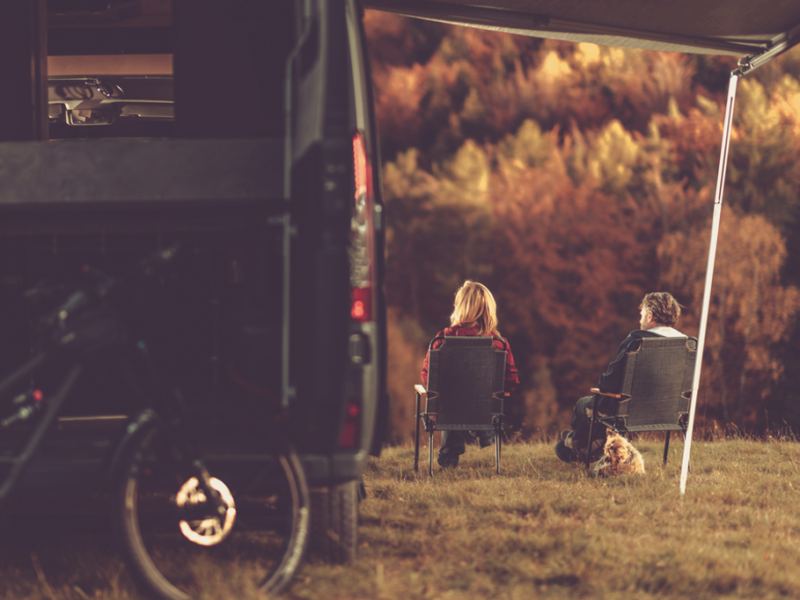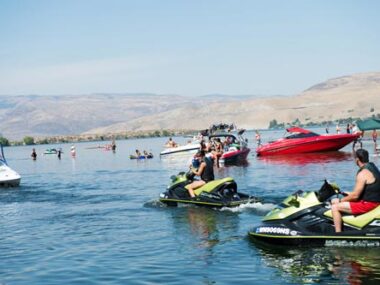Dry camping has gained quite a bit of exposure and popularity over the past decade as an increasing number of folks are excited by the prospect of taking their recreational vehicles or campers out into more natural settings.
If you don’t know what dry camping is, it is when a person opts to take their van, RV, motorhome or the like and go camping in rural spots outside of traditional campgrounds. It is also commonly referred to as free camping, wild camping and boondocking.
Source: Virrage Images/Shutterstock.com
However, because of the very nature of boondocking, you are not going to have any power hookups or other amenities you might typically find at a campsite. Thus, there are some items that you are going to need to make your trip more comfortable, convenient and safe.
That said, here is the ultimate checklist of boondocking essentials.
Showering Options
Depending on how long you are planning on boondocking, you are going to need to figure out how to clean yourself. While wet wipes can be a great option for a short while, they are certainly not a long-term solution.
Therefore, it is wise to pick up a camp shower solution. These can range between a few dollars and several hundred, depending on what you decide is necessary.
Batteries
All recreational vehicles come equipped with one or two house batteries, which serve to power a variety of appliances, lights, pumps and other items. However, you might want to consider storing some extras.
Fortunately, there are a variety of different kinds of RV batteries for dry camping. The last thing you want is to be out in the wilderness and find yourself without electrical power.
Solar Panels or a Generator
No matter how many batteries you have aboard your vehicle, they will need to get charged eventually. Therefore, bringing solar panels or a generator along for the ride will allow you to stay off the grid for longer.
Additionally, solar panels are no longer the massive expense that they once were and even casual dry campers often have modestly-sized portable solar panels for their RVs.
Propane Tanks
If you are boondocking in a RV or utilize various propane-powered camping gear, you are going to need a substantial supply of propane.
Source: Virrage Images/Shutterstock.com
Similarly, if you are using a propane-powered, dual fuel or tri-fuel generator, propane is going to be a necessity. Therefore, it is critical to pack a few extra tanks for the journey. After a few outings, you’ll have a good idea of how much you need to take for each adventure.
Lighting Solutions
When you are boondocking, you are going to need various light sources, as well as efficient lighting to help conserve energy. Therefore, it is wise to swap out all the lights in your RV for LED lightbulbs, as these use far less energy than their traditional counterparts.
Similarly, you are also going to need a variety of outdoor lights. Thus, purchasing LED flashlights, headlamps, lanterns and similar items is essential for being able to see in the darkness — and being able to see is a good thing.
A Dishwater Pan
Given that you are limited in the amount of potable water in your possession, conservation is essential. Procuring a dishwater pan to wash your dishes in can go a long way toward that aim.
Additionally, you can reuse the water in the pan for other uses, such as flushing the toilet, which also helps to save water.
Portable Water Jugs
Source: MD_Photography/Shutterstock.com
While food and water are obvious necessities you can add to your hard coolers, water is worth discussing as it gets used for far more than one realizes until its availability is limited.
Therefore, if you don’t want to be restricted by the size of your fresh water tank, it is highly advisable to bring along a handful of plastic five-gallon jugs, LifeSaver Jerrycans, WaterBricks or other means of storing clean water.
However, no matter which option you choose, be sure that you have enough water for the trip. As a general rule of thumb, you will need to have one gallon of drinking water per person, per day.
Temperature Control
When you are camping at a campsite with hookups, it is easy to take for granted the access to electricity to run your air conditioner or heater to make yourself more comfortable.
However, when you are out dry camping, no such luxury is available, so you are going to have to get a bit more creative with your approach to heating and cooling your vehicle.
One way that you might go about this includes picking up a simple 12-volt fan that you can power via battery or solar panels. Alternatively, when it is cold out, you might consider busting out a Mr. Heater Buddy, which runs off propane bottles (or tanks if you have an adapter hose).
Bringing Along the Boondocking Necessities
Boondocking can be a lot more challenging than simply pulling into a campsite and hooking up your vehicle. However, it tends to be a lot more rewarding as well.
Just make sure that you bring the supplies listed above and you are sure to have a successful dry camping adventure.





